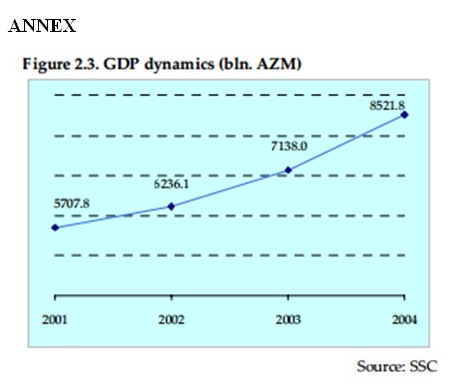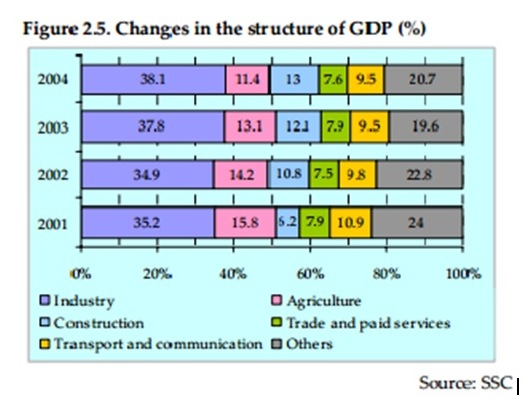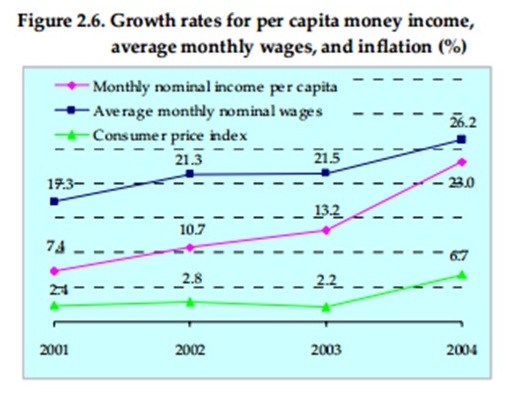Millenium Development Goals was accepted at the Millenium Summit in September 2000, with the participation of 191 nations, who represents a commitment to halve the number of the world’s population living in poverty by 2015. In order to meet the challenges that were stated in the Declaration, a set of 8 global MDGs were designed; with 18 concrete targets, and 48 indicators for monitoring progress in achieving the goals and targets, which included eradicating extreme hunger and poverty, achieving universal primary education, promoting gender equality and empowering women, reducing child mortality, improving maternal health, combating HIV/ AIDS, Malaria and other diseases, ensurig environmental sustainability, creating global partnership for devlopment. The former President Heydar Aliyev was among the world leaders who represented a commitment and signed the Millennium Declaration on behalf of the Republic of Azerbaijan. Azerbaijan, like the other signatories of the Millennium Declaration, embarked on the task of adapting the global MDGs to its specific conditions, and discussed the policy efforts and budget allocations which will be required in order to achieve them. Firstly, the baseline year for the global MDG targets was cosidered 1990. However, the discussion process showed that 1990 was not a suitable baseline year for Azerbaijan. While different baseline years were considered for different targets (ranging from 1990 to 2002), it was proposed to take 2001/02 as the baseline year for all country-specific targets. Since poverty was considered to be a multi-dimensional phenomenon, with all different aspects reinforcing each other. It was better to have the same baseline for all indicators, to have a complete picture, and to move parallel towards the goals. So 2001/02 was accepted as baseline for all indicators and some some policies were discussed and accepted. In those times, because the poverty was one of the main goals, a state programme was accepted which contained almost the same goals and development purposes with MDGs.
STATE PROGRAMME On Poverty Reduction & Economic Development 2003 – 2005.[1]
I quote here: “In order to further strengthen social protection of the population for the near future, ensure poverty reduction in the country and implement necessary measures to meet the commitments of the 2000 United Nations Millennium Summit, I hereby decree:
- The “State Program on Poverty Reduction and Economic Development in the Republic of Azerbaijan for 2003-2005” shall be approved.
- The Ministry of Economic Development of the Republic of Azerbaijan shall be responsible for coordinating the implementation of measures set out in the State Program.
- The Cabinet of Ministers of Azerbaijan Republic shall be responsible for taking steps to ensure the implementation of this Decree.
- This Decree shall become effective from the date of signature”
Heydar Aliyev
Former President of the Republic of Azerbaijan Baku, February 20, 2003 N 854
As it was mentioned before, poverty reduction, eradicating hunger were main goals.
The 191 countries undertook the role of to reducing poverty by the year 2015, according to the Millennium Declaration that was signed in New York by the UN General Assembly. Since the launch of this Programme, a worthy significant progress has been acheived in Azerbaijan, following the goals set out in the SPPRED and the country-specific Millennium Development Goals. According to Farhad Aliyev, Minister of Economic Development, central and local executive bodies, other relevant agencies, international donor organizations, foreign and local.
NGOs, and also civil society had great impacts and roles in achieving the goals that were specified in the SPPRED and MDGs.
In the UN 2005 report about the Progress in Azerbaijan Towards the Achievement of MDGs, chapters summorize the works that were done. Chapter 1 shows the debates and policy making process about MDGs in the country, Chapter 2 is attempts to depict the statistical information and indicators which can be used to monitor various dimensions of poverty. Also, the country’s most vulnerable groups- refugees and IDPs problems are also discussed here. All the implementation reports on the works that were shown in SPPRED, Fiscal Policy, Monetary Policy and Banking, Investment Policy, Energy Policy, and Employment Policy are shown in Chapters 3, 4, 5, 6. Also, the policies for Education, Culture, Health, Social Protection, and improvement of the living standards of Refugees and IDPs are mentioned. According to this report, economic development came to the point that it was obvious to see the improvements. GDP in 2004 increased by 68191.1 bln. AZN. The macroeconomic stability was strengthened, economic foundations of the state became stronger which had the possibility to lead to the new opportunities for poverty reduction. Also, changes were observed in te structure of GDPs. (See the charts 1 and 2 below/ Annex) [2]
The increase percentages for 2004-2005 were observed in the Inverstments Structures as well:
Oil and gas production- 76.4; processing industry 3.0; electricity and water supply sectors- 1.2; Agriculture- 0.7; Construction- 0.2; Trade and services 1.1; Transport 6.4; Communication 2.1; Construction of dwellings 6.2; Other sectors 3.0
By the implementation of MDG policies, banking system in Azerbaijan was developed and the number of private banks was increased. Momey income and avarage monthly wages of people were increased. (chart 3 below/ Annex)
A special attention was given for the entrepreneurship in the regions. In order to increase public awareness of the business people, a website on “State Support to Entrepreneur” (www.sahibkar.biz) was created, and a “hot line” service (4971332) organized at the MoED to respond to any business-related questions and prevent unnecessary interventions in entrepreneurial activities. Also an economic TV programme was established about the economic developoment, booklets and handbooks about business planning was published. Also, within the framesworks of UNDP Azerbaijan, women living i rural areas were empowered to build their own business, in order to fulfil the MDG 3- Promoting Gender Equality and Empower Women and to empower women for engaging in social life and making their own money, start their business making at least small contributions to the development of economy. The trainings were also conducted within the project to give women in rural areas some skills to rule their business. (See the chart 4 below/ Annex)
The 2011-2015 program mostly initiated in Neftchala region in order to empower the women’s participation in socio-economic life. The UNDP Azerbaijan Reports shows:
(Translated from Azerbaijani)
Duration of the program: The years of 2011-2015
Strategic Plan: 4th Goal: To get achievement in reducing gender inequality and promoting the expansion of women power
Name of the project: Technical support project: providing economic and social protection of women living in rural and regional areas
Atlas code: 00061827
Beginning date: 1 January, 2015
End date: 31 December 2015-ci
The required amount 112,000 USD
The fund allocated: 110,000 USD
In-kind support 52,000 USD
Economic relations of the country with foreign investors also developed as a result of MDGs and SPPRED policies. Especially the Germany-Azerbaijan economic relations, attraction of German investments and integration of the local entrepreneurs into European markets. A meeting of the Azerbaijan-Britain Board of Trade and Industry was held in Baku with participation of about 20 British and about 20 Azerbaijan companies in June 28, 2004. Representatives of the British companies visited Ganja and Tovuz on June 29, 2004 and became familiarized with the locally based enterprises. A delegation consisting of representatives from 10 Singaporean companies and the Singapore International Organization visited Baku, had relevant meetings and signed cooperation agreements. In March 78 2004, a Memorandum of Cooperation was signed between the Business Consulting Services Programme of the EU and the Fund. A Conference on Trade and Investment in Azerbaijan, was held in London at the EBRD Headquarters in December 14, 2004 with participation of about 300 people including high officials and business people from Azerbaijan, as well as government and business representatives of Great Britain and other European countries. The objective of the Conference was to attract potential investors from Great Britain and other European countries to Azerbaijan, in particular to the non-oil sector and also, to raise awareness of the European businesses and European community about Azerbaijan. As a result of targeting activities of the Government of Azerbaijan, the conference, which was held in the capital of Italy Rome at the end of February 2005 succeeded in attracting additional investments to the country and establish business relations between the businessmen of the two countries. A Baku Business Center has been established in the National Seaside Park in 2003 with support from the UNDP.
Significant imrovements were seen in oil industry as well. Azerbaijan witnessed a significant increase in revenue from oil production. This led to much of the public investment needed in order for the country to achieve the MDGs by 2015.
Azerbaijan had a better chance than most other CIS countries of meeting MDG 1 (reducing poverty and extreme poverty). Many efforts were provided to use oil revenues continuesly; to develop the non-oil sector by means of the developed investment and business environment and to provide the equatable distribution of the outcomes of economic growth throughout the country. MDG 2 (universal primary education) was rated higher than the European countries of the CIS, but still has to concentrate on improving the quality of school education and also the provision of equal gender representation of students in schools. As it comes to MDG 3 (Gender Equality and Empowerment), UNDP implemented some projects as showen above, Also, the increase was observed in the women’s representation in Parliament. For MDG 4 (Child Mortality), sustainable progress mostly depends on the works for reduction in income poverty belongs to MDG 1. Although Primary Health Care Reforms were conducted, tis goal will be developed during the implementation of SDGs . There are problems of data collections for MDG 4 and 5, which still need to be solved in order to set realistic and meaningful national targets. For MDG 6 (HIV/ AIDS, malaria and other diseases), Azerbaijan has been better in managing the spread of HIV/AIDS than in some other countries of the CIS. However, the country needs to work for the protetion of forest areas, with regard to MDG 7 (environmental sustainability). Although the supply of improved drinking water for urban areas was provided, progress is still slow in rural areas. In MDG 8, youth unemployment is being addressed to a certain extent through the Government’s Regional Development Programme, which aims to promote job creation in the regions.
The Minister of Economic Development announced in October 2004 that the next stage of SPPRED will be a ten year programme, for the period 2006-2015. This will allow even better alignment of the country’s national development strategy with its MDGs. However, in line with the recommendations made in the MPR, policy measures may also be linked to the shorter three-year time framework established for budgeting and costing (as with the first MTEF).
Azerbaijan now is gettign prepared for the implementation of Sustainable Development Goals (SDGs) [3]– the 30 years program of UN which is commited to transfor the world into a better place and ensure the developments be sustainable. Te goals are deeper and more broadly worked than MDgs. SDGs are 17 in number: ending poverty; ending hunger and achieving food security and promoting sustainable agriculture; ensuring healthy lives and promoting well-being for all at all ages; ensuring equatable quality education and promoting lifelong learning opportunities for all; achieving gender equality, empowering women; availability and sustainable management of water and sanitation; access to reliable sustainable modern energy for all; economic growth; building infrastructure; making cities and hman settlements safe; sustainale consumption; combat climate change; sustainable use of seas, marine resources; prection of forests; peace, strog institutions; partneship for the goals.




BY: Turkan Devrijova
[1] The State program covers 7 Chapters that contain information about the policies that were considered to be conducted to reduce poverty by the state of Azerbaijan, as a follow up commitment to the MD Goals.
[2] All charts are shown below in Annex
[3] SDGs are follow up and expand of MDGs which were agreed by governments in 2000 and due to expire at the end of this year. SDGs are 15 year program, which is considered to be ended in 2030.
References:
- Empowering rural women to participate in Economic and Social Life. Retrieved from: UNDP Azerbaijan website. http://www.az.undp.org/content/azerbaijan/en/home/operations/projects/womens_empowerment/Promoting_Rural_Women_Participation_in_the_Economic_and_Social_Lifel.html. (Last access 08.12.2015)
- Food and Agriculture Organization of the United Nations (FAO). Food Comes First: FAO and the Eight Millennium Development Goals. Rome: FAO, 2010. BA Call Number: 363.8091724 F6861 (F2 — FAO) Also available as online e-book: www.fao.org/mdg/22417-0c56b91e357c66fad721be8d55841a98d.pdf
- Millenium Development Goals report 2015 Retrieved from: http://www.un.org/millenniumgoals/2015_MDG_Report/pdf/MDG%202015%20rev%20(July%201).pdf. (Last access 08.12.2015)
- MDG’s Indicators. Retrieved from http://mdgs.un.org/unsd/mdg/default.aspx. (Last access 08.12.2015)
- The Millennium Development Goals and Beyond: Global Development after 2015 (Global Institutions) 1st Edition. Rorden Wilkinson (Editor). David Hulme (Editor)
- National MDG Reports/ Azerbaijan. Retrieved from http://www1.unece.org/stat/platform/display/MDG/National+MDG+reports+and+on-line+databases (Last access 05.12.2015)
- Sustainable Development Goals. Retrieved from https://sustainabledevelopment.un.org/?menu=1300 (Last access 07.12.2015)
- Young Women Neftchala 2015, UNDP Report. (word doc)
- World Bank. Miniatlas of Millennium Development Goals: Building a Better World. Washington, DC: World Bank, 2005
 Oval Useful news from Azerbaijan and Caucasus
Oval Useful news from Azerbaijan and Caucasus